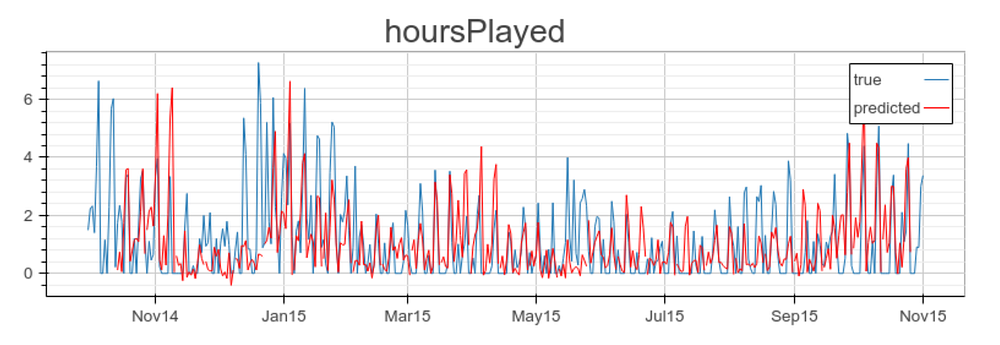Written by Mike Schaekermann.
In everyday life, we seldom do things for the first time. Instead, a large part of our behaviour is determined by habits rather than conscious motivation [1]. Therefore, it is not unreasonable to assume that habitual behaviour may also be a strong determinant for what we do as players in online gaming environments. A major focus of the HCI Games Group is on developing a deeper understanding of the psychological constructs that drive human behaviour in digital games. In this spirit, one of our ongoing projects revolves around the underrepresented topic of habits in online games.

Massively Multiplayer Online Games (MMOGs) naturally lend themselves to a closer examination of habitual gaming patterns for two reasons: first, players who like a particular game often spend large amounts of time in its virtual environment, increasing the chance of certain behaviours to be performed repeatedly and eventually turn into habits. Second, it is not uncommon for game studios to store detailed information about what players do in the game environment — a technique referred to as “telemetry” [5]. This information is normally used to analyse usage patterns and improve a game title over time, but it can also be leveraged for scientific endeavours like ours. Only a few studies from the fields of psychology and human-computer interaction have looked at how habit can be measured [4], how the formation of habit strength can be modelled over time [6] and in what way habit strength may be used to predict future behaviour in online virtual environments [2,3].
In our ongoing research project about the role of habit in online gaming environments, we apply time series modelling and data mining techniques to extract highly repetitive patterns of behaviour from massive data sets of MMOGs. In particular, we are taking closer look at player personality traits in the game Destiny, and have recently launched a large-scale online survey for this project. If you are a passionate Destiny player and would love to learn about your own personal player type, you should not hesitate to take our survey as well!
In hopes that we caught your interest in the force of habit, we will keep you updated about the progress of this project in future posts and scientific publications. This project is in collaboration with Mike Schaekermann, Lennart Nacke from the University of Waterloo, Canada, as well as Anders Drachen from Aalborg University, Denmark, and Rafet Sifa from Fraunhofer Institute for Intelligent Analysis and Information Systems (IAIS), Germany.
Contact
If you are interested in this project and have some more questions about it, as always, I would love you to hear from you — either via Twitter: @HardyShakerman or email: mikeschaekermann@gmail.com
References:
[1] Neal, D. T., Wood, W., Labrecque, J. S., & Lally, P. (2012). How do habits guide behavior? Perceived and actual triggers of habits in daily life. Journal of Experimental Social Psychology, 48(2), 492–498. http://doi.org/10.1016/j.jesp.2011.10.011
[2] Wohn, D. Y. (2012). The Role of Habit Strength in Social Network Game Play. Communication Research Reports, 29(1), 74–79. http://doi.org/10.1080/08824096.2011.639912
[3] Wohn, D., Velasquez, A., Bjornrud, T., & Lampe, C. (2012). Habit as an explanation of participation in an online peer-production community. In Proceedings of the 2012 ACM annual conference on Human Factors in Computing Systems — CHI ’12 (p. 2905). New York, New York, USA: ACM Press. http://doi.org/10.1145/2207676.2208697
[4] Verplanken, B., Myrbakk, V., & Rudi, E. (2005). The measurement of habit. In The routines of decision making. (pp. 231–247). Mahwah, NJ: Lawrence Erlbaum. Retrieved from http://opus.bath.ac.uk/9436/
[5] El-nasr, M. S., Drachen, A., & Canossa, A. (2013). Game Analytics. (M. Seif El-Nasr, A. Drachen, & A. Canossa, Eds.). London: Springer London. http://doi.org/10.1007/978-1-4471-4769-5
[6] Lally, P., van Jaarsveld, C. H. M., Potts, H. W. W., & Wardle, J. (2010). How are habits formed: Modelling habit formation in the real world. European Journal of Social Psychology, 40(6), 998–1009. http://doi.org/10.1002/ejsp.674
Dr. Gustavo Tondello was an instructor and support coordinator for the Cheriton School of Computer Science. He was a Ph.D. student at the University of Waterloo under the supervision of Dr. Lennart Nacke and Dr. Daniel Vogel and a graduate researcher at the HCI Games Group. He is a co-founder of MotiviUX and a member of the International Gamification Federation. His research interests include gamification and games for health, wellbeing, and learning, user experience in gamification, and gameful design methods. His work focuses on the design and personalization of gameful applications. His publications advanced the current knowledge on player and user motivations in games and gameful applications and introduced new frameworks and approaches to designing personalized gameful applications and serious games. He periodically blogs about gamification for the HCI Games Group and on his personal blog, Gameful Bits. Before coming to Canada, Gustavo earned his M.Sc. in Computer Science and his B.Sc. in Information Systems from the Federal University of Santa Catarina (UFSC) and worked for several years as a Software Engineer in Brazil. Gustavo is also a Logosophy researcher affiliated with the Logosophical Foundation of Brazil and North America.




Leave a Reply